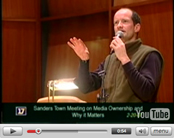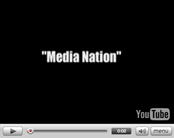FILM REVIEW: No Country for Old Men
Frontier Fracas: No Country For Old Men
“The West is the best.” – Jim Morrison
Or not.
What might you get when you cross a novel penned by Pulitzer Prize winning novelist Cormac McCarthy (The Road, All the Pretty Horses) with the vision of directorial duo the Coen Brothers (“Blood Simple” and “Fargo”)?
That’s the big question knowing audiences are asking of the new film “No Country for Old Men,” featuring an all-star cast and a narrative so spare it makes Ernest Hemingway look like Henry James on uppers. As a storyteller, McCarthy is well-known for his taut dialogue, explosive violence, lack of descriptive details or punctuational niceties, and tight-lipped male western characters – quintessential frontier types cut in the mythical tradition of Frederick Jackson Turner.
The Coen Brothers wisely decide not to mess with this formula. In fact, it plays right into many of their strengths.
1980 is the year. The Tejano borderlands is the place. Three stories unfold together in the dusty southwestern desert. An escaped hit man named Anton Chigurh (the sinisterly monotone Javier Barden) goes on a killing spree armed only with a high pressure cattle-killing device– a lethal weapon in the capable hands of this deadly dude. Meanwhile, a rifle-toting working class welder/hunter named Llewelyn Moss (a convincing Josh Brolin) stumbles across a remote drug deal gone awry, and walks away from three truckloads of dead Mexicans – “a colossal goat fuck in the middle of the desert” - with a briefcase full of $2 million in one hundred dollar bills. A horse-riding sheriff (Tommy Lee Jones) winds up investigating the crime scene with an eye towards solving the mystery, continually playing catch up as the movie unfolds.
McCarthy (and the Coens) weave together these three stories – with terrifying results.
“I think were looking at more than one fracas,” observes the deputy to the sheriff. “Its a mess, aint it?”
If it aint,” the sheriff responds, “Itll do until the mess gets here.”
Indeed.
Like most of McCarthy’s stories, “No Country For Old Men” explores the darkness and depravity of the human soul, and the ease with which the fragility of human relationships crumbles in the face of unexpected but not uncontrollable circumstances. Fate and choice play a role here, too, as the two main characters engage in an intricate game of cat and mouse that takes them from the isolated sands of a trailer park into the hotel of a nearby frontier town.
“I gotta bad feeling, Llewelyn,” Moss’ wife worriedly exclaims as he puts her on a bus to their relatives.
Well I gotta good one so I guess that evens out.”
The Coen Brothers make the most of McCarthy’s penchant for lean (borderline non-existent) dialogue – the movie is marked by painfully long pauses in the verbal action, filled only by the sounds of drawers opening, vehicles moving, doors closing, and always, the ambient noise of the awesome desert. There is no musical score in this film to speak of – a calculated gamble made by the directors to underscore the stark intensity of the story.
And there is humor here, too – at odd moments, when you don’t expect it.
“If I dont come back,” Moss says to his wife, “Tell my mother I love her.
Your mothers dead, Llewelyn.
Well then Ill tell her myself.”
The Coen brothers’ film arrives at an oddly appropriate time. We live at a historical moment where vague clichés – “freedom,” “democracy,” “human rights,” “free market” –run point for what is, in reality, an incredibly violent world. “No Country for Old Men” travels directly into that vague and nebulous territory – a place where choices have consequences, a society where trivial dialogue between strangers masks latent violence that erupts with sudden fury.
“The West is a messy place,” historian Sarah Deutsch once wrote. Indeed, never more so than in this oddly terrifying tale of human nature seemingly beyond redemption.



![View your cart items []](/sites/default/modules/ecommerce/cart/images/cart_empty.png)




